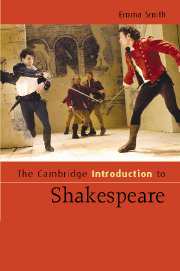Chapter 3 - Texts
Published online by Cambridge University Press: 05 June 2012
Summary
Shakespeare's hand
The Book of Sir Thomas More, a play about a riot in London and dating from the early 1590s, was probably never performed and exists only in a hectic and partial manuscript including the handwriting of at least five individuals. It has, however, become significant to Shakespeareans because of the widely held belief that one of the writers who contributed to the manuscript may have been Shakespeare. If this is indeed so, the manuscript provides the only example of his literary work that we have in his own writing. No other contemporary hand-written script of a Shakespeare play exists, and the only samples of his handwriting that we do have are signatures to business and legal documents. If the handwriting scholars call ‘Hand D’ in the manuscript of Thomas More is indeed Shakespeare's, then those leaves of paper offer us something like a holy relic: even the common synecdoche ‘hand’ for ‘handwriting’ works to suggest that we are getting something of the physical man himself.
The truth is that the evidence that Shakespeare wrote this part of Thomas More is actually rather slight, although many collected editions, including those under the Oxford, Norton and Riverside imprints, now include the speeches as part of the canon. But our desire for the manuscript to give us access to Shakespeare's creative processes as he wields his quill is something that underscores all our work on the attributed plays of Shakespeare – it's the same impulse which drives the perennial interest in Shakespeare's biography.
- Type
- Chapter
- Information
- The Cambridge Introduction to Shakespeare , pp. 46 - 70Publisher: Cambridge University PressPrint publication year: 2007



